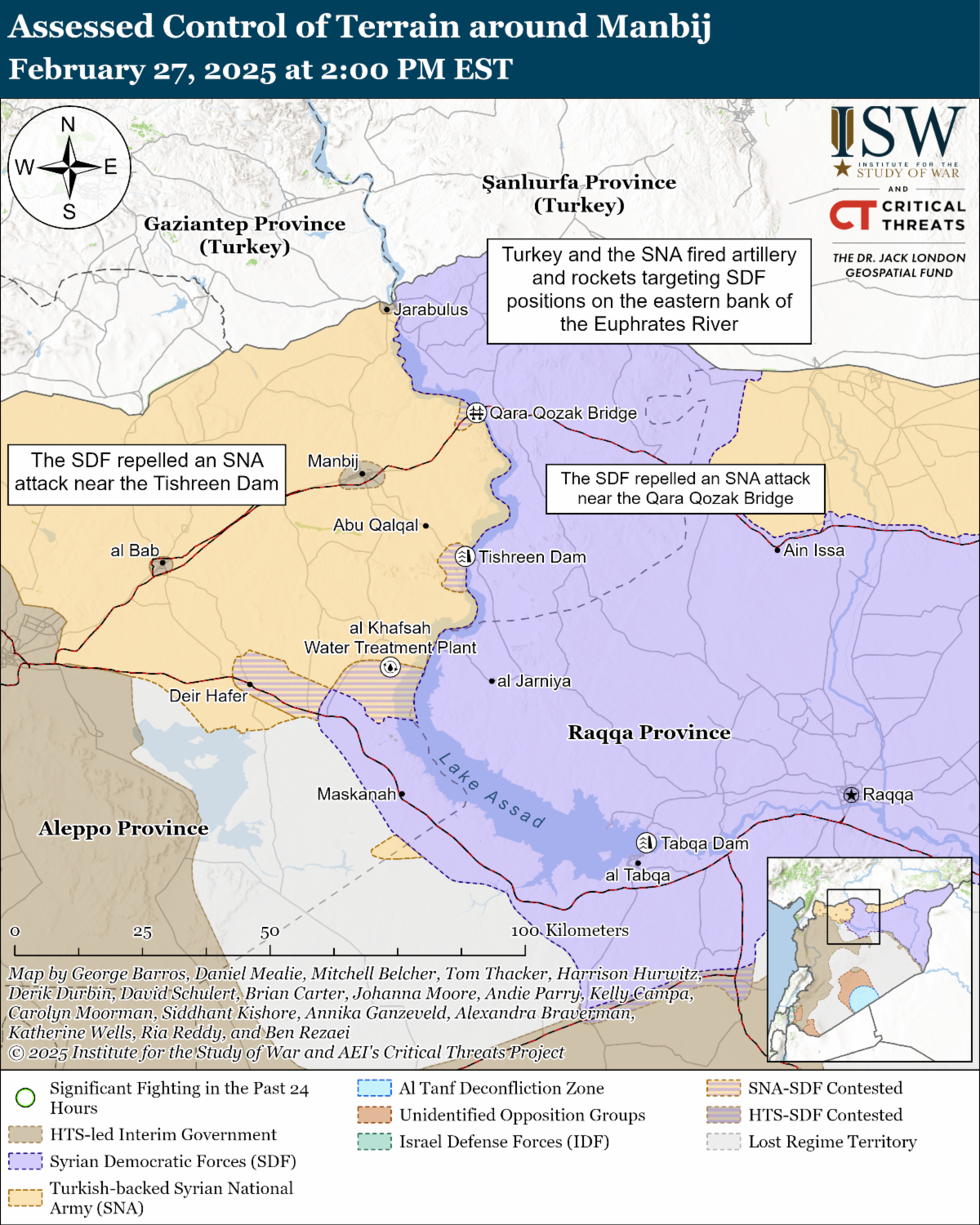US-backed Syrian Democratic Forces (SDF) Commander Mazloum Abdi rejected a call from Kurdistan Workers’ Party (PKK) leader Abdullah Ocalan to disarm and dissolve. Ocalan, who is imprisoned in Turkey, said that “all groups must lay [down] their arms” and called on PKK leaders to hold a conference to dissolve the PKK. Abdi replied that Ocalan’s statement “is only for the PKK [and is not] related to us in Syria.” Abdi stated that peace between the PKK and Turkey would strip Turkey of any justification for continuing attacks against Kurdish groups in Syria, however. The chairperson of the Democratic Union Party (PYD), which dominates the SDF, separately stated that “if the reasons for carrying weapons disappear, we will lay them down,” implying that the SDF will not disarm until Turkey and the Turkish-backed Syrian National Army (SNA) cease attacks on the SDF in northeastern Syria.
Turkish officials previously signaled that they believed a call to the PKK from Ocalan to disarm and dissolve would pressure the SDF into agreeing to disarm and integrate into the Hayat Tahrir al Sham (HTS)-led interim government. This belief reflects misplaced Turkish thinking that the entire SDF would be responsive to PKK direction. Abdi’s response to Ocalan’s call furthermore suggests that Abdi views himself as a Syrian Kurdish leader, not a transnational Kurdish separatist leader, and that he prioritizes protecting the SDF and Syrian Kurds from human rights abuses and political marginalization over pursuing larger Kurdish separatist goals. Abdi has consistently rejected the idea of SDF-held territory in northeastern Syria seceding from the Syrian state but has advocated for a federalist system.
Abdi likely rejected Ocalan’s call in part because the Syrian interim government has not provided guarantees to the SDF that it would protect SDF territory and Syrian Kurds during the integration of the SDF into the interim government. The interim government has insisted that the SDF completely disarm and join the new Syrian army as individuals. Abdi has emphasized that he would want the SDF to join the new Syrian army as a “military bloc,” however. The integration of the SDF into the Syrian Ministry of Defense as individuals would involve dismantling current SDF formations and building new formations in the Syrian Army that include relatively small numbers of SDF fighters sprinkled among multi-ethnic, theoretically apolitical units loyal to the national army. This process would inevitably force the SDF to halt its operations against Turkey and the Turkish-backed Syrian National Army (SNA) in northeastern Syria in order to deconstruct its own forces. The interim government has not provided guarantees to the SDF that it would prevent Turkey or the SNA from advancing into SDF-held territory or committing crimes against Kurds in northeastern Syria while the SDF integrates into the Defense Ministry. Some of the SNA factions that are fighting the SDF are sanctioned for committing serious human rights abuses against Kurds during the Turkish-backed operation to seize Afrin, northwestern Syria, in 2019.
The interim government appears to have double standards for the integration of the SNA and SDF into the Defense Ministry. The SNA has begun integrating its forces into the Defense Ministry in recent weeks. The rate of SNA attacks and activity against the SDF in northeastern Syria has not decreased, however, indicating that either the interim government has not yet integrated the SNA factions as individuals or alternatively has allowed SNA factions to integrate into the Defense Ministry as blocs. The SNA would have to stop fighting, deconstruct its forces, and then rebuild its forces as new, multi-ethnic, theoretically apolitical units loyal to the Defense Ministry chain of command to integrate as individuals and fully dissolve themselves.
The SDF could agree to disarm and integrate into the interim government if the interim government provides security guarantees and additional assurances on decentralization to the SDF and Syrian Kurds. The SDF could become more willing to disarm and dissolve if all armed factions, including the SNA, enter the Syrian Defense Ministry as individuals. The integration of individual SNA fighters into new Syrian army units that are not associated with the SNA could reduce the risk that the SDF currently perceives from the SNA. The interim government has announced the integration of former armed groups into the interim government, but these groups appear to have been integrated in name only. The interim government will likely need to make identical demands for all armed factions and secure some sort of political agreement and ceasefire with the SDF if it wants the SDF to integrate into the interim government.
Key Takeaways:
- PKK and the Syrian Democratic Forces (SDF): US-backed SDF Commander Mazloum Abdi rejected a call from PKK leader Abdullah Ocalan to disarm and dissolve. Turkish officials previously signaled that they believed a call to the PKK from Ocalan to disarm and dissolve would pressure the SDF into agreeing to disarm and integrate into the Hayat Tahrir al Sham (HTS)-led interim government.
- SDF-Damascus Negotiations: The SDF commander likely rejected Ocalan’s call in part because the Syrian interim government has not provided guarantees to the SDF that it would protect SDF territory and Syrian Kurds during the integration of the SDF into the interim government. The SDF could agree to disarm and integrate into the interim government if the interim government provides security guarantees and additional assurances on decentralization to the SDF and Syrian Kurds.
- Iran and Iraqi Views on Syria: Iran is likely pressuring the Iraqi federal government to avoid normalizing ties with the Syrian interim government. Some Iranian-aligned Iraqi actors oppose normalization between Iraq and Syria and Turkish influence in Syria for their own reasons. Some of these reasons align with Iranian interests.
| 




 [ISW] 러시아의 공세 캠페인 평가, 2025년 2월 27일
[ISW] 러시아의 공세 캠페인 평가, 2025년 2월 27일